INTERNACIONAL
Iran vs Israel: How potential conflict could look according to experts: ‘Already at war’
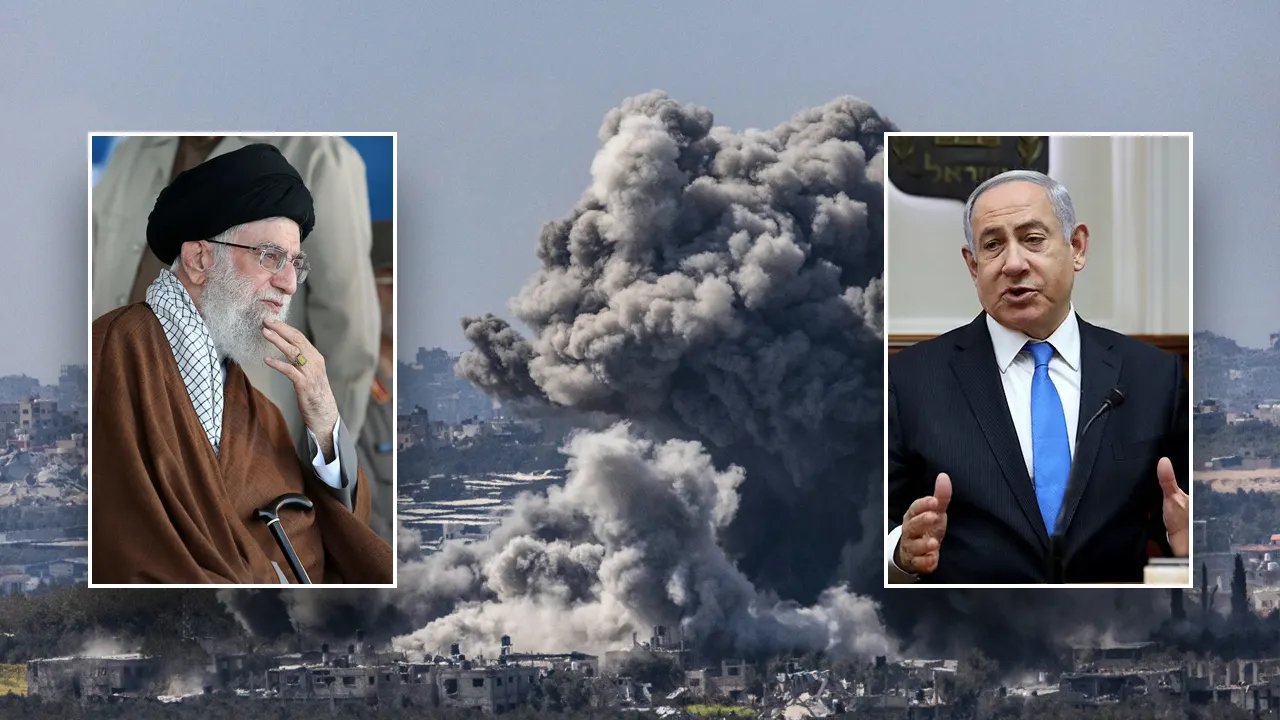
War between Iran and Israel would be to no one’s benefit in the region as it would likely end up in a pitched battle that regional forces would keep away from, experts told Fox News Digital.
«Frankly, none of the Arab states would want to take either side in this conflict,» Matt McInnis, senior fellow for the Institute for the Study of War, explained. «They may inevitably be drawn into it, and I think that’s one of the things that Iran is very worried about.»
«[Iran is] not quite sure if Israel’s efforts over the last few years to increase diplomatic and security relationships with states like Saudi Arabia, the Emirates, Qatar, Kuwait and others are sufficient to keep these states out of a larger conflict,» McInnis added.
«Our bases and others in those countries, in a larger and larger conflict as part of our support and defense of Israel is obviously very complicated,» McInnis explained. «I think that on the Iranian side, certainly the Syrians will side with them, but I don’t know what material support that provides aside from potentially allowing Iran to use Syrian territory for attacks.»
BIDEN EXPECTS IRAN TO ATTACK ISRAEL ‘SOONER THAN LATER’
Tehran has continued to threaten a response against Israel for the attack on an Iranian consulate in Damascus that killed seven Islamic Revolutionary Guard Corps (IRGC) members, including two generals.
U.S. CENTCOM Gen. Michael Kurilla has been in Israel, where he met with Israeli Minister of Defense Yoav Gallant on Friday to assess military preparedness, moving up his plans due to the threats from Iran, Pentagon Press Secretary Maj. Gen. Pat Ryder confirmed during a press conference Thursday.
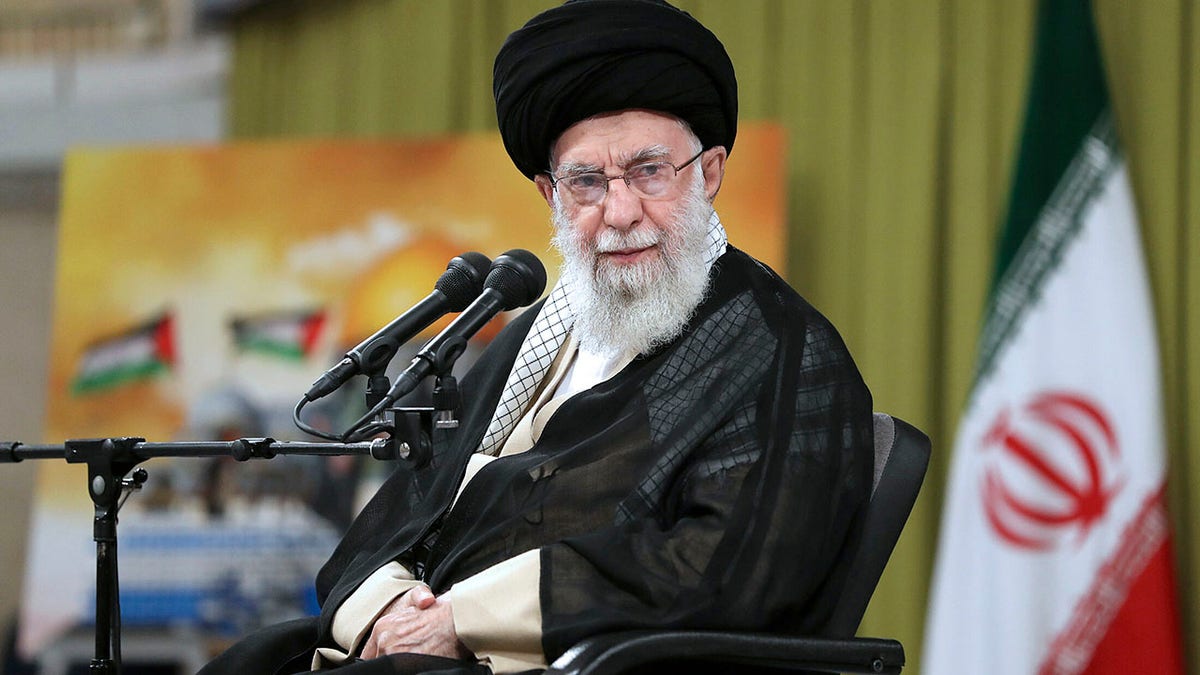
Iranian Supreme Leader Ayatollah Ali Khamenei attends a meeting with a group of students in Tehran, Iran, on Wednesday, November 1. (Office of the Iranian Supreme Leader via AP)
U.S. Nation Security Council Coordinator for Strategic Communications John Kirby on Friday told reporters that the U.S. remains in «constant communication» with Israeli counterparts to make sure they are ready for attack but refused to «armchair quarterback … in a public way in terms of the conversations we’re having or what we’re seeing in the intelligence picture.»
Jonathan Conricus, a former spokesman for the IDF and now a Senior Fellow at the Foundation for Defense of Democracies (FDD) commented on what he said was the media hype and tension and even a ‘minor panic’ in Israel over the so-called Iranian retaliation against Israel after the Damascus attack last week.
Speaking on FDD’s Morning Brief podcast, he said that while Iran has a lot of options, he said he had «quite solid faith in Iranian strategic patience.»
«They are disciplined, they are long-term thinkers, they do not take rash decisions based on emotions … even though the rhetoric is high,» Conricus said.

U.S. Central Command (CENTCOM) Gen. Michael Kurilla met with Israeli Minister of Defense Yoav Gallant amid rising tensions with Tehran. (Ariel Hermoni/IMoD)
«I know that it wouldn’t be smart for Iran to attack Israel, because then the distraction in Gaza and Lebanon will become a forgotten issue, and everything will focus on Iran, on its hostile and negative activities in the Middle East, and they themselves will be front and center of Israeli and perhaps U.S. attention, and the Iranians do not want that,» he added. «They don’t want it because it will put focus on their nuclear plans and because it will take pressure off Israel from its fighting in Gaza and Lebanon.»
During an appearance on Friday’s episode of «Fox & Friends,» Gen. Jack Keane of the Institute for the Study of War (IFSW) said an attack will happen at some point, because Iran «cannot avoid the international publicity surrounding the taking down of the IRGC headquarters in Syria,» saying it was «just a reality» but adding that Iran will likely pursue a «measured response» and does not really want escalation.
IMMINENT ATTACK FROM IRAN KEEPS ISRAEL ON ALERT AS US ADMITS ‘CREDIBLE’ THREAT FROM TERROR STATE
Keane suggested that the best way to handle Iran was to destroy its IRGC assets in Iran, because «Iran does not want to escalate,» claiming Iran has «a weak air force … a weak navy» and «not particularly well trained or … well equipped» troops – instead, he argued that Iran relies heavily on its drone and missile arsenal.
«Iran knows that war with them would destroy their regime economically, and they likely lose it,» Keane insisted. «The leverage has always been on the side of Israel, the United States and the West, but we absolutely refuse to use it.»
McInnis agreed with Keane’s assessment, but he argued that it largely depended on what shape the conflict would take. His estimation determined that in small-scale personnel-driven engagements, Iran could find some gains due to the integration of IRGC personnel with proxy forces such as Hezbollah in Lebanon.

Iran’s Supreme Leader Ayatollah Ali Khamenei and Israeli Prime Minister Benjamin Netanyahu inset over an explosion on the border of Israel. (Getty Images)
«If we got to that point, I think some of those smaller scale operations, on the ground, I think the Iranians are in better shape than they would have been a couple of decades ago,» McInnis said.
ISRAELI PM, MILITARY LEADERS HOLD EMERGENCY MEETING AMID POSSIBLE DIRECT IRANIAN ATTACK
«But it is true for a long, all-out war, which I don’t really foresee … I guess that’s a fair critique,» he continued. «They have certainly improved in their ability to coordinate very sophisticated drone cruise and ballistic missile actions, and we look at the classic one in Saudi Arabia in 2019, [which] was the kind of beginning of that period where we have these far more sophisticated capabilities combined with what Lebanese Hezbollah could do.»
«I think both the Iranians and the Israelis are most concerned about if this becomes a ground war, similar or in some ways inspired by the October 7th Hamas attack, where it’s not just missiles and drones but combined with ground operations,» he explained.
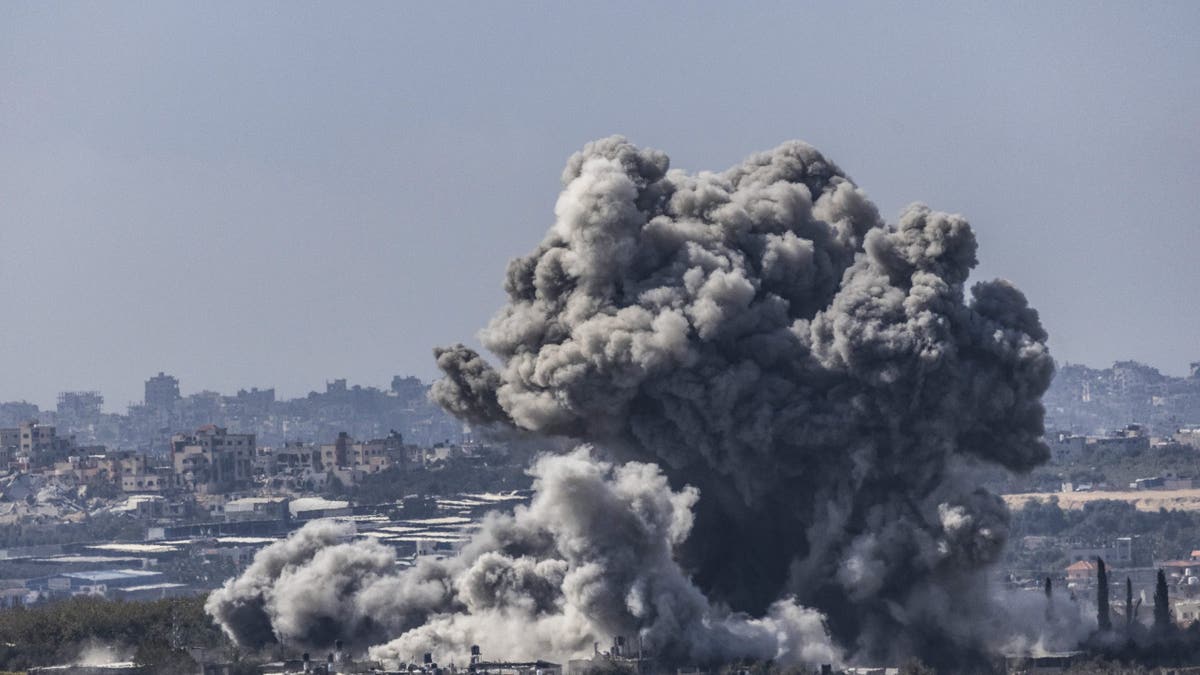
Thick smoke billows from an explosion on the Israel-Gaza border, as seen from Sderot. (Ilia Yefimovich/picture alliance via Getty Images)
«That’s something that, I think in particular, the Israelis and the Iranians are worried we’re going to end up in that type of conflict in southern Lebanon or even in northern Israel struggling to go on as another as a kind of a flashpoint,» he added. «I think that’s where the capabilities of Iran’s axis of resistance, along with the Revolutionary Guard Corps, could still be fairly serious to Israel’s security.»
Bill Roggio, founder and editor of the «The Long War Journal,» stressed Iran’s reliance on proxy groups to wage war and keep enough distance to maintain something of a response without the rampant escalation that would accompany direct response.
«I think one of the things that’s kind of misunderstood is that Iran and Israel are already at war, it’s just Iran is doing it via its proxies. Israel is under attack already by the Iranian proxies – but they could be escalating, right?» Roggio said. «So, at the bare minimum, these are Iran’s closest allies in the region, and they do wield significant power: Lebanon, the proxy, particularly in Iraq, essentially running things.»
CLICK HERE TO GET THE FOX NEWS APP
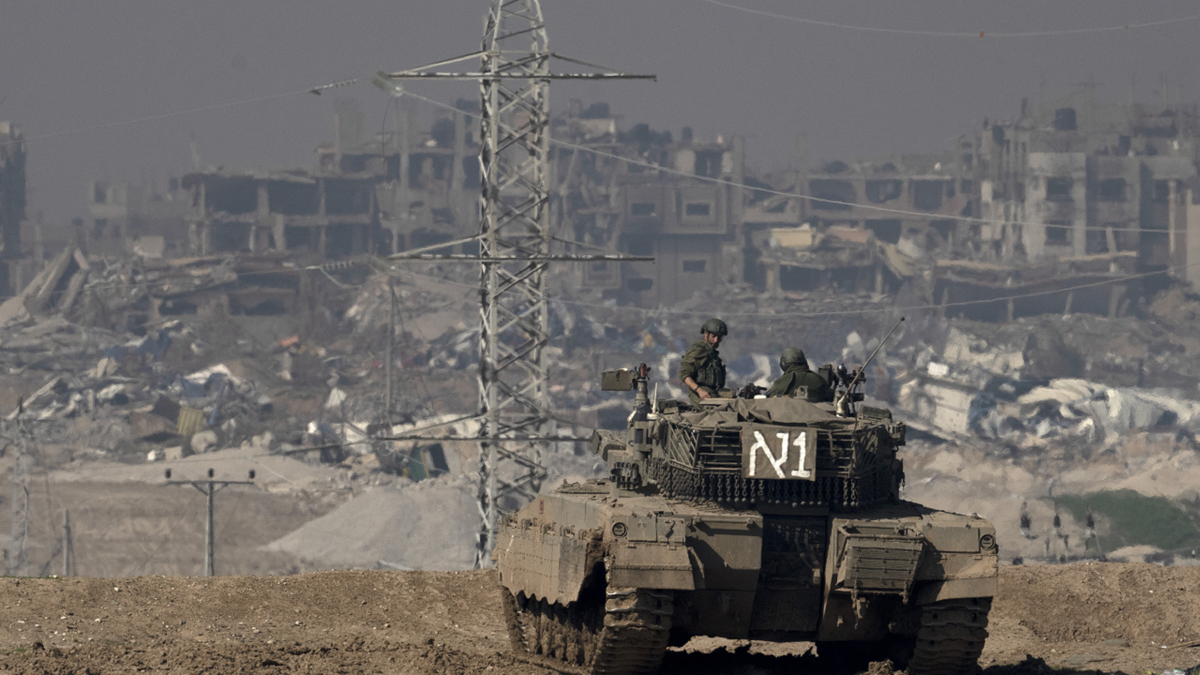
Israeli soldiers on a tank overlook the Gaza Strip on Friday, Jan. 19. (AP/Maya Alleruzzo)
«The Saudis have indicated that they really don’t want to be a frontline state,» Roggio added. «They’ve experienced Iranian attacks with drones, and, given Israel’s position in Gaza, I don’t expect the Egyptians or any other Arab country to come to the Israeli side.»
Roggio also noted that Russia and China have a vested political and diplomatic interest in Iran, which they last year invited to join the BRICS economic bloc. Highlighting the «tightened» bonds between the three countries, he argued that Iran and China could provide support that aimed to keep the conflict «hot» but was unclear how that might happen.
INTERNACIONAL
«Estamos abandonados por todo el mundo»: entrevista al pediatra palestino que operó, salvo vidas y lo perdió todo

¿Gaza convertida en la Costa Azul?
INTERNACIONAL
Uruguay deja de reconocer a Edmundo González como presidente electo en Venezuela

Qué había dicho Lacalle Pou sobre Edmundo González Urrutia
INTERNACIONAL
White House backs Israel’s decision to halt Gaza aid shipments until Hamas accepts ceasefire extension

The White House is supporting the Israeli government’s decision to block aid to Gaza until Hamas leaders agree to a ceasefire extension, according to a newly-released statement.
In a statement obtained by Fox News on Sunday, National Security Council spokesman Brian Hughes said that Israel has «negotiated in good faith since the beginning of this administration to ensure the release of hostages held captive by Hamas terrorists.»
«We will support their decision on next steps given Hamas has indicated it’s no longer interested in a negotiated ceasefire,» Hughes added.
Earlier on Sunday, Israeli officials announced that they are stopping the entry of all goods and supplies into the Gaza Strip and warned Hamas it would face «additional consequences» if it does not accept a new proposal for an extended ceasefire.
ISRAEL AGREES TO TRUMP ENVOY’S TEMPORARY GAZA CEASEFIRE EXTENSION PROPOSAL AS FIRST PHASE EXPIRES: REPORTS
Israeli Prime Minister Benjamin Netanyahu speaks during a press conference in Jerusalem on Dec. 9, 2024. (Maya Alleruzzo/Pool/AFP via Getty Images)
«With the conclusion of the 1st stage of the hostages deal and in light of Hamas’ refusal to accept the [U.S. Mideast envoy Steve] Witkoff framework for the continuation of the talks, to which Israel agreed, PM Netanyahu decided: as of this morning, entry of all goods & supplies to the Gaza Strip be halted,» Israeli Prime Minister Benjamin Netanyahu’s office said on X.
«Israel will not allow a ceasefire without a release of our hostages. If Hamas persists in its refusal, there will be additional consequences,» the post added.
Hamas accused Israel of attempting to derail the fragile truce, saying its decision to cut off aid was «cheap extortion, a war crime and a blatant attack on the (ceasefire) agreement.»
«The occupation’s announcement of halting the entry of aid into the Gaza Strip is yet another confirmation of its failure to uphold its commitments and its evasion of obligations under the ceasefire agreement,» Hamas said in a statement. «This reflects its ugly criminal face and constitutes a continuation of the genocide against our people, as well as an act of blackmail targeting an entire population by depriving them of food, water, and medicine.»
The first phase of the Israel-Hamas ceasefire, which included an uptick in humanitarian assistance, expired on Saturday. The two sides have not yet negotiated the second phase, in which Hamas was called to release dozens of remaining hostages in return for an Israeli pullout and a permanent ceasefire.
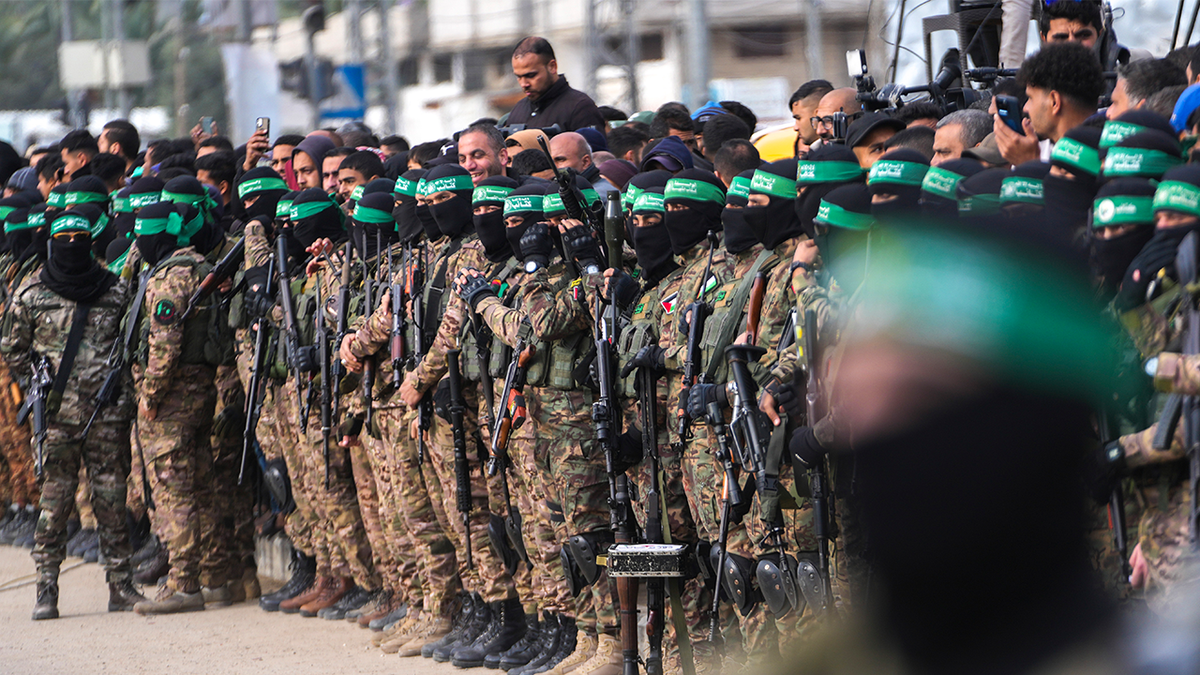
Hamas terrorists take up positions ahead of a hostage release in Deir al-Balah, central Gaza Strip, Feb. 8, 2025. (AP)
An Israeli official said the decision to suspend aid was made in coordination with the Trump administration.
Israeli officials said earlier on Sunday that they support a proposal to extend the first phase of the ceasefire through Ramadan and Passover, or April 20. They said the proposal came from the Trump administration’s Middle East envoy, Steve Witkoff.
Under that deal, Hamas would release half the hostages on the first day and the remainder when an agreement is reached on a permanent ceasefire, according to Netanyahu’s office.
In the first phase of the ceasefire, Hamas released 25 Israeli hostages and the remains of eight others in exchange for nearly 2,000 Palestinians imprisoned by Israel. Israeli also pulled back forces from most of Gaza and allowed a surge of humanitarian aid to enter the region.
But the first phase also featured various disputes, as each side accused the other of violating the ceasefire.
Hamas now says Israel committed another violation by suspending aid. The terror group said deliveries were supposed to continue as the two sides negotiated the second phase of the ceasefire.
HAMAS RELEASES MORE HOSTAGES IN EXCHANGE FOR MORE THAN 600 PALESTINIAN PRISONERS AS PART OF CEASEFIRE DEAL

Hamas fighters stand in formation as Palestinians gather on a street to watch the handover of three Israeli hostages to a Red Cross team in Deir el-Balah, central Gaza, on Feb. 8, 2025. (Majdi Fathi/NurPhoto via Getty Images)
CLICK HERE TO GET THE FOX NEWS APP
The war began when Hamas launched a surprise attack against Israel on Oct. 7, 2023, killing roughly 1,200 people and abducting more than 251. Hamas still has 59 hostages, 32 of whom are believed to be dead.
Israel’s offensive into Gaza in response to Hamas’ attack has killed more than 48,000 Palestinians, according to the Hamas-run government’s Gaza Health Ministry. It does not specify how many of the dead were terrorists or civilians.
The Associated Press contributed to this report.
-
POLITICA2 días ago
Nueva encuesta y sorpresa en la Ciudad: lidera un radical K y está tercero un abogado de famosos
-
POLITICA3 días ago
Javier Milei y sus medidas, EN VIVO: en un Congreso repleto de faltazos, el Presidente habla en cadena nacional para abrir la sesiones ordinarias
-
ECONOMIA2 días ago
«El valor del bitcoin cae un 17,11% este mes: ¿Es este el momento perfecto para invertir?




































